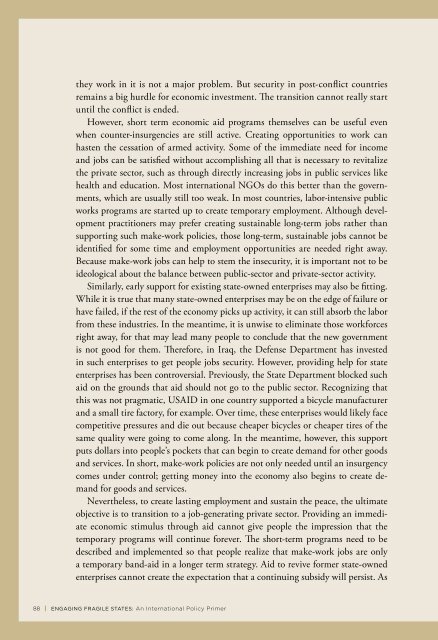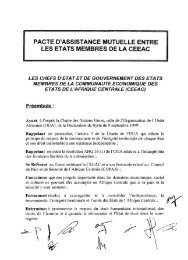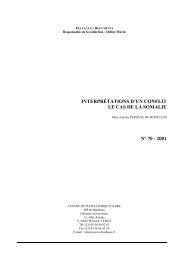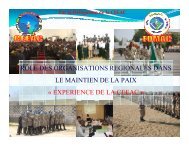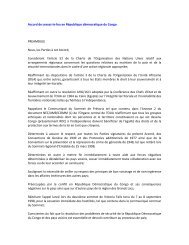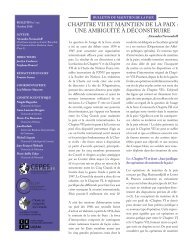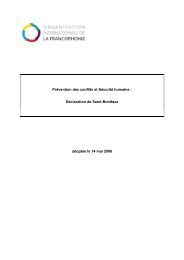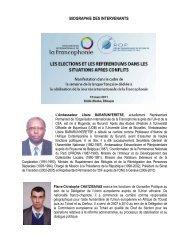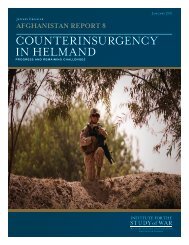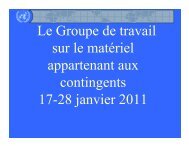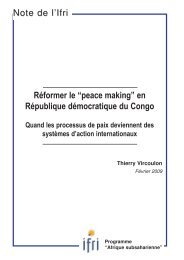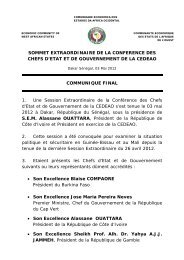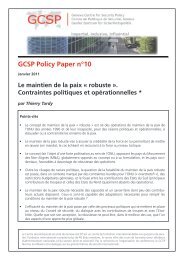engaging fragile states - Woodrow Wilson International Center for ...
engaging fragile states - Woodrow Wilson International Center for ...
engaging fragile states - Woodrow Wilson International Center for ...
Create successful ePaper yourself
Turn your PDF publications into a flip-book with our unique Google optimized e-Paper software.
they work in it is not a major problem. But security in post-conflict countries<br />
remains a big hurdle <strong>for</strong> economic investment. The transition cannot really start<br />
until the conflict is ended.<br />
However, short term economic aid programs themselves can be useful even<br />
when counter-insurgencies are still active. Creating opportunities to work can<br />
hasten the cessation of armed activity. Some of the immediate need <strong>for</strong> income<br />
and jobs can be satisfied without accomplishing all that is necessary to revitalize<br />
the private sector, such as through directly increasing jobs in public services like<br />
health and education. Most international NGOs do this better than the governments,<br />
which are usually still too weak. In most countries, labor-intensive public<br />
works programs are started up to create temporary employment. Although development<br />
practitioners may prefer creating sustainable long-term jobs rather than<br />
supporting such make-work policies, those long-term, sustainable jobs cannot be<br />
identified <strong>for</strong> some time and employment opportunities are needed right away.<br />
Because make-work jobs can help to stem the insecurity, it is important not to be<br />
ideological about the balance between public-sector and private-sector activity.<br />
Similarly, early support <strong>for</strong> existing state-owned enterprises may also be fitting.<br />
While it is true that many state-owned enterprises may be on the edge of failure or<br />
have failed, if the rest of the economy picks up activity, it can still absorb the labor<br />
from these industries. In the meantime, it is unwise to eliminate those work<strong>for</strong>ces<br />
right away, <strong>for</strong> that may lead many people to conclude that the new government<br />
is not good <strong>for</strong> them. There<strong>for</strong>e, in Iraq, the Defense Department has invested<br />
in such enterprises to get people jobs security. However, providing help <strong>for</strong> state<br />
enterprises has been controversial. Previously, the State Department blocked such<br />
aid on the grounds that aid should not go to the public sector. Recognizing that<br />
this was not pragmatic, USAID in one country supported a bicycle manufacturer<br />
and a small tire factory, <strong>for</strong> example. Over time, these enterprises would likely face<br />
competitive pressures and die out because cheaper bicycles or cheaper tires of the<br />
same quality were going to come along. In the meantime, however, this support<br />
puts dollars into people’s pockets that can begin to create demand <strong>for</strong> other goods<br />
and services. In short, make-work policies are not only needed until an insurgency<br />
comes under control; getting money into the economy also begins to create demand<br />
<strong>for</strong> goods and services.<br />
Nevertheless, to create lasting employment and sustain the peace, the ultimate<br />
objective is to transition to a job-generating private sector. Providing an immediate<br />
economic stimulus through aid cannot give people the impression that the<br />
temporary programs will continue <strong>for</strong>ever. The short-term programs need to be<br />
described and implemented so that people realize that make-work jobs are only<br />
a temporary band-aid in a longer term strategy. Aid to revive <strong>for</strong>mer state-owned<br />
enterprises cannot create the expectation that a continuing subsidy will persist. As<br />
88 | Engaging Fragile States: An <strong>International</strong> Policy Primer


